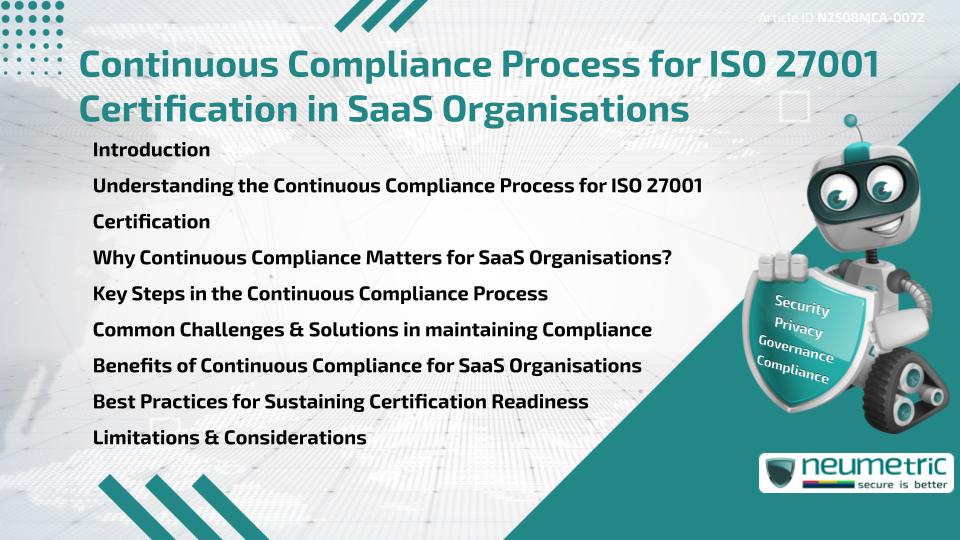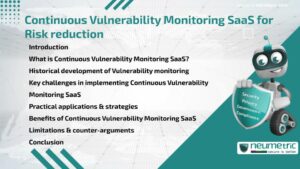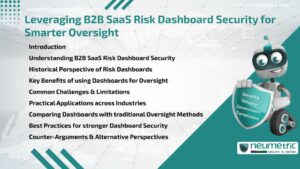Table of Contents
ToggleIntroduction
The Continuous Compliance Process for ISO 27001 Certification ensures that SaaS Organisations maintain alignment with the requirements of the Information Security Management System [ISMS] Standard on an ongoing basis. Instead of preparing for Audits in One-off cycles, Continuous Compliance builds a culture of ongoing monitoring, updates & improvements. This Article explores the Methodology, Challenges, Benefits & Best Practices for SaaS Organisations working toward or maintaining ISO 27001 Certification.
Understanding the Continuous Compliance Process for ISO 27001 Certification
ISO 27001 sets International Standards for managing Information Security. Achieving Certification is a significant milestone, but retaining it requires ongoing effort. Continuous Compliance means embedding Compliance checks, monitoring & reporting into daily Business Operations.
Rather than viewing Compliance as a Once-a-year exercise, SaaS Organisations integrate it into workflows, leveraging Automation & Governance Tools. For background, see ISO.org.
Why Continuous Compliance Matters for SaaS Organisations?
SaaS Organisations manage sensitive Customer Data, making Information Security both a Regulatory & Business priority. The Continuous Compliance Process for ISO 27001 Certification is vital because:
- Threat landscapes evolve rapidly in SaaS Environments.
- Clients demand proof of consistent Security Practices.
- Audit Readiness reduces Operational Disruption.
- Proactive monitoring prevents Compliance Gaps.
For further context, the NCSC UK Security guidance explains how resilience requires consistent oversight.
Key Steps in the Continuous Compliance Process
- Risk Assessment & Updates – Regularly review Risks to ensure relevance.
- Policy Management – Keep Security Policies current with changes in Operations or Regulations.
- Control Monitoring – Use Automated Tools to Continuously track Control effectiveness.
- Employee Training – Conduct ongoing Awareness Sessions to reduce Human Error.
- Internal Audits – Schedule Periodic Audits instead of waiting for Certification Cycles.
- Corrective Actions – Quickly Remediate Findings & Track improvements.
The IT Governance ISO 27001 resources provide Practical Frameworks for these steps.
Common Challenges & Solutions in maintaining Compliance
- Resource Limitations – Adopt Automation Platforms to reduce Manual workload.
- Employee Fatigue – Use engaging Training methods to keep Staff motivated.
- Data Complexity – Implement Centralised Monitoring Dashboards.
- Audit Pressures – Spread Compliance tasks evenly throughout the year.
The ISACA Risk Management resources give further insight into overcoming Compliance fatigue.
Benefits of Continuous Compliance for SaaS Organisations
- Audit Readiness – Simplifies Certification Renewals.
- Operational Efficiency – Reduces Last-minute Compliance efforts.
- Stronger Security Posture – Keeps Controls effective against evolving Risks.
- Client Assurance – Demonstrates a commitment to safeguarding Sensitive Data.
Best Practices for Sustaining Certification Readiness
- Establish clear Ownership of Compliance responsibilities.
- Leverage SaaS Compliance Tools to Automate Evidence collection.
- Integrate Compliance Metrics into Business Performance Dashboards.
- Conduct regular reviews with Management & Stakeholders.
For practical improvements, see NIST CyberSecurity Framework.
Limitations & Considerations
The Continuous Compliance Process for ISO 27001 Certification requires commitment & investment. Over-reliance on Automation without Human Oversight can miss Context-specific Risks. Additionally, External Factors like new Regulations may still create Gaps. SaaS Organisations must balance Automation with Governance & Expertise.
Takeaways
- The Continuous Compliance Process for ISO 27001 Certification integrates Security into daily SaaS Operations.
- It involves ongoing Risk reviews, Monitoring & Staff Training.
- Success requires automation, Governance & a Culture of Accountability.
FAQ
What is the purpose of the Continuous Compliance Process for ISO 27001 Certification?
It ensures SaaS Organisations maintain Compliance throughout the year, not just at Audit time.
How does it benefit SaaS Organisations?
It improves Security, reduces Audit Stress & Strengthens Client Trust.
Is Automation essential for Continuous Compliance?
Not mandatory, but it significantly reduces Workload & improves Accuracy.
How often should Risk Assessments be updated?
At least Quarterly or whenever major changes occur in Systems or Processes.
Does Continuous Compliance replace External Audits?
No, but it makes Audit Preparation easier & more efficient.
References
- ISO.org – ISO/IEC 27001 Information Security
- NCSC UK – Security Guidance
- IT Governance – ISO 27001 Resources
- ISACA – Risk Management Resources
- NIST – CyberSecurity Framework
Need help for Security, Privacy, Governance & VAPT?
Neumetric provides Organisations the necessary help to achieve their CyberSecurity, Compliance, Governance, Privacy, Certifications & Pentesting needs.
Organisations & Businesses, specifically those which provide SaaS & AI Solutions in the Fintech, BFSI & other regulated sectors, usually need a CyberSecurity Partner for meeting & maintaining the ongoing Security & Privacy needs & requirements of their Enterprise Clients & Privacy conscious Customers.
SOC 2, ISO 27001, ISO 42001, NIST, HIPAA, HECVAT, EU GDPR are some of the Frameworks that are served by Fusion – a SaaS, multimodular, multitenant, centralised, automated, CyberSecurity & Compliance Management system.
Neumetric also provides Expert Services for technical Security which covers VAPT for Web Applications, APIs, iOS & Android Mobile Apps, Security Testing for AWS & other Cloud Environments & Cloud Infrastructure & other similar scopes.
Reach out to us by Email or filling out the Contact Form…





